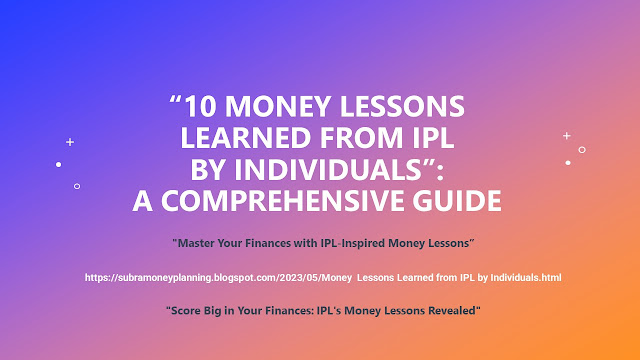"Master Your Finances with IPL-Inspired Money Lessons"
The Indian Premier League (IPL) has not only been a platform for thrilling cricket matches but has also provided valuable money lessons that individuals can apply to their personal finances. This blog post explores the financial strategies and lessons that individuals can learn from the IPL. From smart investments to budgeting, risk management, and financial discipline, we will delve into the key money lessons derived from the IPL, supported by real-life examples.
"Score Big in Your Finances: IPL's Money Lessons Revealed"

10 Money Lessons Learned from IPL by Individuals : A Comprehensive Guide
Money Lesson 1: Making Informed Investment Decisions
The IPL teaches individuals the importance of making informed investment decisions. Just like IPL team owners carefully evaluate players' skills and potential, individuals should conduct thorough research before investing their money. For instance, investing in a startup or a stock requires diligent analysis, understanding market trends, and assessing the growth potential.
Example: Similar to how the Mumbai Indians invested in young talents like Jasprit Bumrah and Hardik Pandya, individuals can identify promising investment opportunities in sectors or companies that show long-term growth potential.
Money Lesson 2: Diversifying Income Streams
The IPL emphasizes the significance of diversifying income streams to mitigate risks and create financial stability. Relying solely on a single income source can be risky, as fluctuations or disruptions in that source can significantly impact one's financial well-being. Individuals should explore multiple income streams, such as side businesses, investments, or freelance work, to diversify their earnings.
Example: Much like IPL teams diversify their revenue through sponsorships, individuals can explore freelance opportunities, rental income, or dividend-paying investments to create multiple income streams.
Money Lesson 3: Budgeting and Expense Management
The IPL teaches individuals the importance of budgeting and effective expense management. IPL teams carefully allocate their budgets to various aspects like player salaries, travel expenses, and marketing campaigns. Similarly, individuals should create a budget to track their income and expenses, ensuring they live within their means and prioritize savings and investments.
Example: Just as IPL teams optimize their expenses by avoiding unnecessary costs, individuals can trim their expenses by identifying and eliminating non-essential or wasteful spending habits.
Money Lesson 4: Assessing and Managing Risk
The IPL highlights the need for assessing and managing risks effectively. IPL teams carefully evaluate players' injury risks, performance consistency, and adaptability to different playing conditions before making decisions. Similarly, individuals should assess and manage financial risks by diversifying investments, having contingency plans, and obtaining appropriate insurance coverage.
Example: Like IPL teams analyze player injury risks, individuals should assess their own risks by considering factors such as job security, health, and emergencies, and take necessary measures to protect themselves financially.
Money Lesson 5: Long-Term Financial Planning
The IPL emphasizes the importance of long-term financial planning. Teams strategically plan for the future, investing in young talents and nurturing them for sustained success. Similarly, individuals should have long-term financial goals and develop a plan that includes saving, investing, and retirement planning.
Example: Similar to IPL teams' long-term planning for sustained success, individuals can set long-term financial goals such as saving for a house, retirement, or education and develop a plan to achieve them through consistent saving and investing.
Money Lesson 6: Financial Discipline and Patience
The IPL teaches individuals the value of financial discipline and patience. IPL teams go through ups and downs during the tournament and need patience to achieve success. Similarly, individuals should exercise financial discipline, avoiding impulsive purchases and sticking to their financial plans, even during challenging times.
Example: Just as IPL teams exhibit patience during a losing streak, individuals should maintain discipline during market downturns, avoiding panic selling and focusing on long-term investment goals.
Money Lesson 7: Negotiation and Deal-Making Skills
The IPL showcases the importance of negotiation and deal-making skills in financial success. Franchise owners, players, and sponsors engage in negotiations to secure mutually beneficial agreements. Individuals can apply these lessons by honing their negotiation skills when it comes to salary negotiations, business deals, or even getting the best deals on major purchases.
Example: Just as IPL teams negotiate sponsorship deals, individuals can negotiate better terms on their mortgage or lease agreements, ensuring they secure the most favorable terms and save money in the long run.
Money Lesson 8: Building a Strong Personal Brand
The IPL highlights the power of building a strong personal brand. Players like Virat Kohli and MS Dhoni have cultivated a strong personal brand, which has led to lucrative endorsement deals and increased their market value. Individuals can apply this lesson by building their personal brand in their respective industries, increasing their professional opportunities and potential income.
Example: Similar to how IPL players leverage their personal brand for endorsement deals, individuals can enhance their online presence through social media, create content, and showcase their expertise to attract career opportunities or freelance projects.
Money Lesson 9: Embracing Innovation and Adaptability
The IPL exemplifies the need for embracing innovation and adaptability to stay ahead in a competitive landscape. Teams and players constantly innovate their strategies, training methods, and game plans to gain an edge over their opponents. Individuals can apply this lesson by staying updated with industry trends, upskilling themselves, and embracing technological advancements that can enhance their professional growth and income potential.
Example: Just as IPL teams adopt new technologies like data analytics and performance tracking, individuals can learn new skills, embrace remote work opportunities, or leverage digital platforms to explore innovative ways to earn income or advance their careers.
Money Lesson 10: Building a Supportive Network
The IPL teaches the importance of building a supportive network for financial success. Franchise owners collaborate with sponsors, coaches, and players to create a winning team. Similarly, individuals can benefit from cultivating a network of mentors, colleagues, and industry professionals who can provide guidance, support, and potential business opportunities.
Example: Similar to how IPL team owners rely on their network for sponsorships, individuals can leverage their professional network for job referrals, business partnerships, or mentorship, creating opportunities for growth and financial advancement.
The IPL offers valuable money lessons that individuals can apply to their personal finances. By learning from examples set by IPL teams, individuals can make informed investment decisions, diversify income streams, practice budgeting and expense management, assess and manage risks, engage in long-term financial planning, and cultivate financial discipline and patience. By implementing these money lessons, individuals can improve their financial well-being, achieve their goals, and navigate the ever-changing financial landscape with confidence and resilience.
If you would love this post, you would love to learn more about "Cracking the Code: IPL Money Management Strategies Revealed" also.






0 comments:
Post a Comment